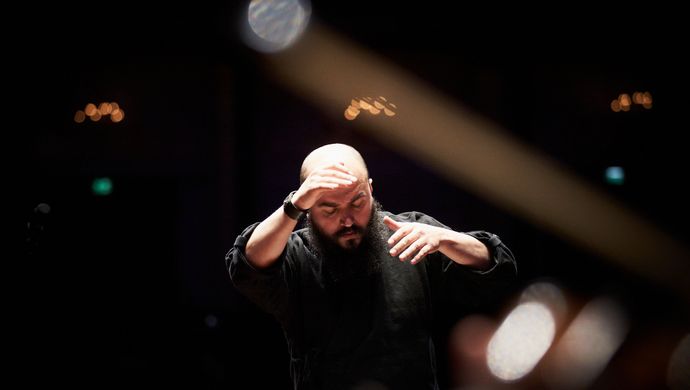Reza Namavar & Maxim Shalygin
sep 14th, 2024, 8.15pm – Bruckner Casco Festival
What to expect?
New piece by Reza Namavar: Bruckner and Reza both build an enormous piece with little thematic material; such a theme is unrecognizably distorted, stretched, and reversed in their music. Both believe that there can only be a big sound if there is also a very small sound, and play the highest instruments sometimes even higher and the lowest even lower to create extreme contrast. Listen to Reza’s Bach in Persia to get a taste of what you will hear.
New piece by Maxim Shalygin: Maxim had nothing to do with Bruckner until he heard the mighty elephant steps of his music in Ingmar Bergman’s film Sarabande. He is fascinated by the sense of weightlessness in Bruckner’s music and has thirteen brass players from the Ludwig Ensemble open organ-like with the closing speech from Bruckner’s 8th. Time and space no longer exist and Maxim’s music takes you to another galaxy. Listen to Maxim’s Severade to get a taste of what you will hear.
Reza Namavar & Bruckner 3
Reza on his new composition
‘Bruckner is the man of the grand sound. He was often criticized for his orchestral doublings (multiple instruments playing the same thing), but this can also be viewed differently: Isn’t a massive sound (tutti: everyone playing) the ultimate end of orchestral density? He achieves his grand sound through 1. doublings, 2. tutti, and 3. stretching the range, the ‘ambitus’. The latter means making the highest instruments play higher and the lowest instruments play lower. I want to compose four movements, like the third symphony, that deal with this grand sound versus a very small sound, because my idea is that you only notice grand sound if there is also small sound.’

Maxim Shalygin & Bruckner 8
Maxim has a natural feel for typical Bruckner characteristics, such as building tension and sustaining a long line in a composition. Additionally, he chooses his focus and knows how to communicate it with his audience, making a relatively long work gain strength and attention. Similar experiences can be found in Todos los Fuegos el Fuego and Lacrimosa.
Maxim on his new composition: Bleeding
Maxim on his new composition Bleeding: ‘I first encountered Bruckner’s music many years ago when I was a child in music school. At that time, this music left no impression on me, and in the future, I even avoided confronting it. But one summer, I started watching all of Bergman’s films, and when I got to Sarabande, I was struck by a moment where the protagonist listens to amazingly powerful music in his room. Immediately after watching it, I discovered it was the Scherzo from Bruckner’s Ninth Symphony. Since then, my relationship with Bruckner’s music has never been the same. Recently, I’ve found that this music, unlike any other from the nineteenth century, is close to the present. Particularly noteworthy is Bruckner’s use of time in his symphonies. That’s what fascinates me most about his music. At first glance, time seems stretched, but when you enter this flow of time, you feel as if you’re in a kind of weightlessness, floating without feeling your own weight. This is a rare feeling in music and one that I’ve tried to achieve in various ways throughout my life.’
Read more on brucknercasco.nl





